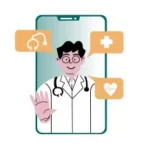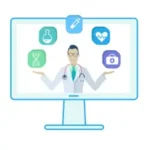
Interoperability, the ability of different healthcare systems and applications to seamlessly exchange and use data, has emerged as a critical challenge in the healthcare industry. The lack of interoperability inhibits effective communication, hinders care coordination, and limits the potential of data-driven insights. In this blog post, we will delve into the Addressing Interoperability Issues faced by healthcare organizations and explore how IT consulting solutions can help overcome these challenges and pave the way for a connected healthcare ecosystem.
Understanding Interoperability in Healthcare:
Begin by explaining the concept of interoperability in healthcare, emphasizing its importance in facilitating the secure exchange of patient information across different systems. Discuss the key stakeholders involved, such as hospitals, clinics, electronic health record (EHR) vendors, and third-party applications.
The Impact of Interoperability Challenges:
Highlight the repercussions of Addressing Interoperability Issues on patient care, operational efficiency, and healthcare outcomes. Discuss the difficulties faced by healthcare providers in accessing complete patient records, exchanging information with external providers, and achieving a holistic view of patients’ health history.
Standards and Protocols:
Explain the role of IT consulting in implementing and adhering to interoperability standards and protocols. Discuss widely used standards such as HL7 (Health Level Seven), FHIR (Fast Healthcare Interoperability Resources), and DICOM (Digital Imaging and Communications in Medicine). Highlight the significance of adopting these standards to enable seamless data exchange.
Data Integration and Systems Connectivity:
Address the challenges associated with integrating data from disparate systems and applications. Discuss the complexity of data mapping, data normalization, and establishing connectivity between different systems. Explain how IT consulting solutions can help organizations design and implement robust integration frameworks, ensuring data flows smoothly across systems.
Overcoming Technical and Semantic Hurdles:
Explore technical barriers that impede interoperability, such as incompatible data formats, varying data semantics, and disparate coding systems. Discuss how IT consulting can assist in data harmonization, implementing data transformation mechanisms, and bridging the gap between different terminologies and coding standards.
Ensuring Privacy and Security:
Discuss the privacy and security concerns associated with interoperability. Address the need for robust data protection measures, secure data exchange protocols, and patient consent frameworks. Explain how IT consulting can help healthcare organizations implement privacy-enhancing technologies and ensure compliance with data protection regulations.
Interoperability and Care Coordination:
Highlight the role of interoperability in facilitating care coordination among different healthcare providers. Discuss how IT consulting solutions can enable real-time exchange of patient information, seamless referrals, and coordinated treatment plans, leading to improved patient outcomes and continuity of care.
Interoperability and Patient Empowerment:
Discuss how interoperability, combined with patient engagement initiatives, can empower individuals to actively participate in their healthcare. Explain how IT consulting can support the development of patient portals, mobile applications, and personal health records that allow patients to access and manage their health information easily.
Future Trends and Innovations:
Explore emerging trends and innovations in interoperability, such as the use of application programming interfaces (APIs), blockchain technology, and cloud-based interoperability platforms. Discuss how IT consulting professionals can guide healthcare organizations in adopting these technologies to enhance interoperability and drive innovation.
Summarize the key points discussed in the blog post, emphasizing the vital role of IT consulting solutions in addressing interoperability challenges in healthcare. Highlight how embracing interoperability can lead to improved care coordination, enhanced patient outcomes, and a more connected healthcare ecosystem.






















